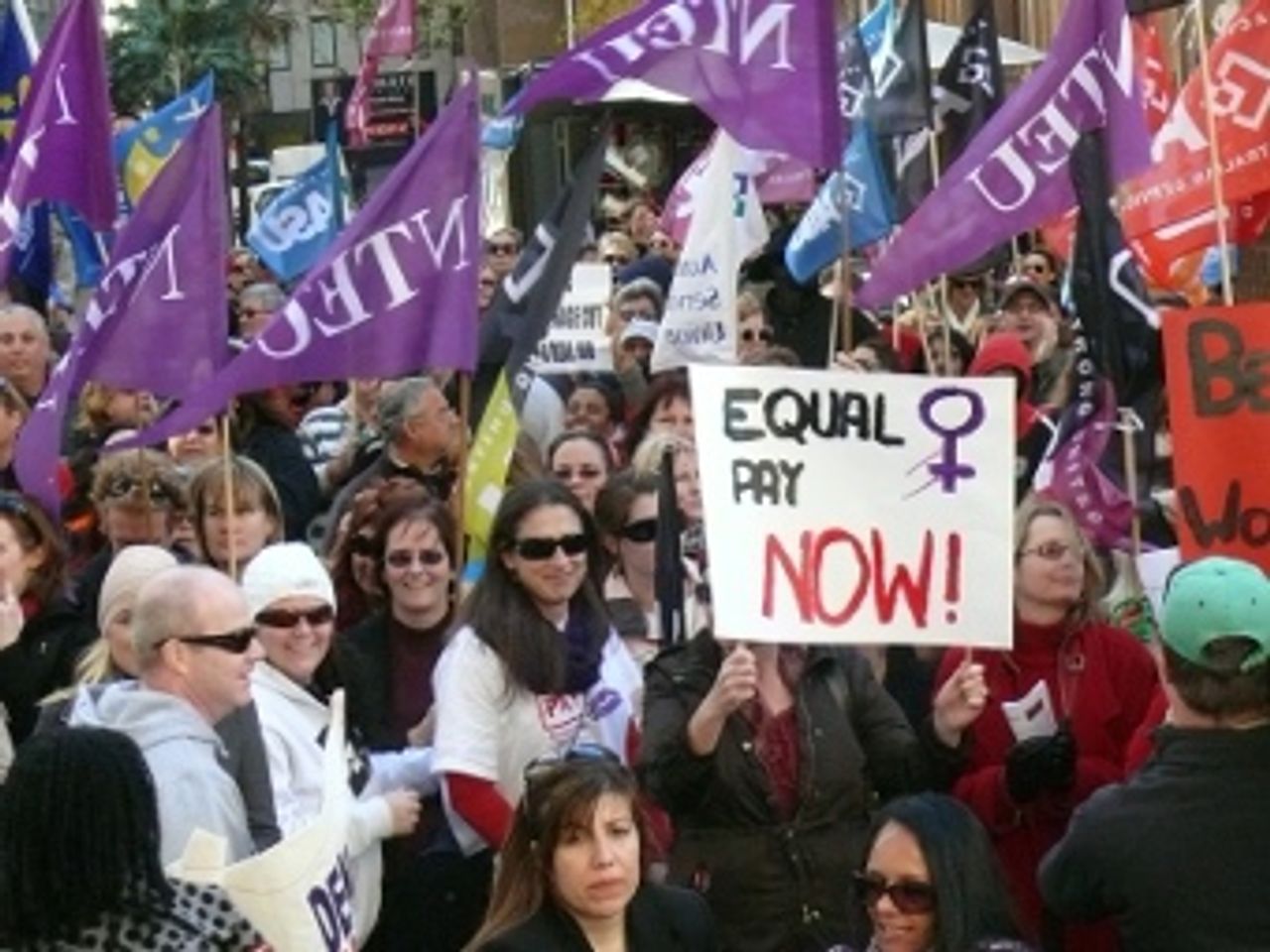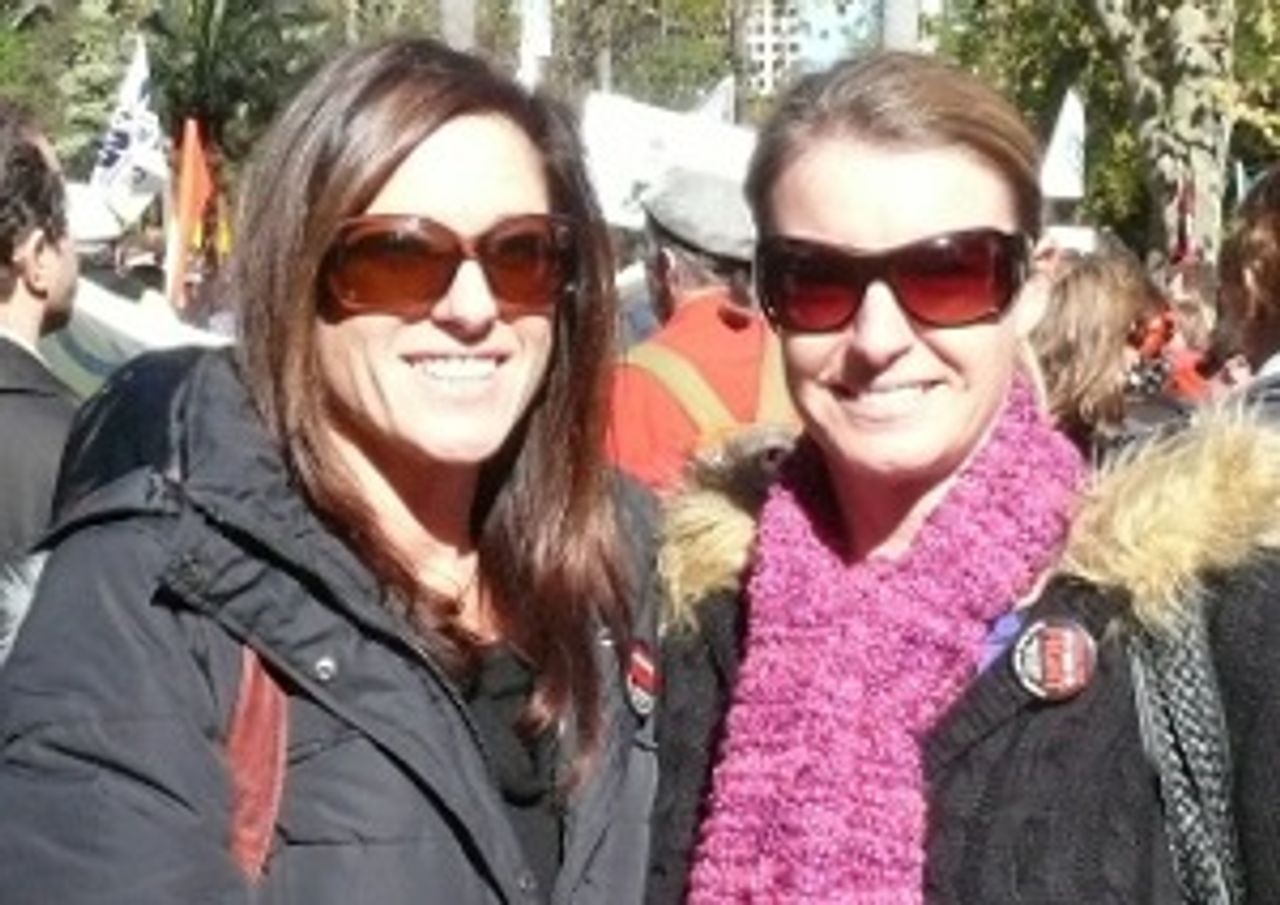Thousands of social and community services (SACS) workers rallied in major Australian cities yesterday to demand equal pay for the predominantly female workforce. In a sector where the entire workforce is notoriously poorly-paid, female SACS workers receive on average 16.9 percent less than their male counterparts.
 Protest outside NSW parliament
Protest outside NSW parliamentReports indicate that 5,000 people attended in Sydney and 2,000 in Melbourne, with hundreds in Newcastle and Lismore in New South Wales, and 500 in Canberra. Rallies were also held in Western Australia, the Northern Territory and South Australia.
More than 200,000 workers are employed in the SACS sector nationally—87 percent of them women—providing care for the homeless, disabled and youth, as well as family counselling services, legal aid and social assistance. Most are employed by non-profit organisations, which depend upon state and federal government funding for 70 percent of their revenue. SACS workers are among the few providing assistance for the poorest and most vulnerable members of society.
The rallies were organised by the Australian Service Union (ASU) as part of its long-running equal pay case in Fair Work Australia (FWA), the federal Labor government’s industrial relations tribunal. The ASU originally filed its application with the FWA in March 2010. The submission stated that the low pay of community sector workers was a result of the overwhelmingly female character of the workforce, not grossly inadequate government funding.
The union has opposed any independent struggle by SACS workers against their low pay and often insecure conditions. Instead, it has insisted that any pay rise can only be achieved through FWA, which operates on pro-market guidelines set by the government and which must take into account the government’s budgetary requirements.
The ASU has hailed an interim May 16 ruling by the tribunal that gender had been an “important influence in creating the gap between pay in the SACS industry and pay in comparable state and local government employment”. The union claimed that the decision was a “historic victory” for equal pay, playing down the fact that neither the state nor federal governments are required to fund any final FWA ruling.
The FWA judges refused to award a pay rise, instead calling for further submissions to clarify the extent to which low pay in the SACS sector was caused by gender discrimination. This procedure allows governments and service provider employers to argue against the financial burden of any pay rise, before the tribunal makes a final ruling in August.
While yesterday’s demonstrations provided a clear indication of the frustration felt by SACS workers over their poor pay and conditions, the union is systematically working to ensure that the growing anger is diverted away from the federal Labor government and kept within the straitjacket of the FWA.
Unions NSW secretary Mark Lennon addressed the Sydney rally, claiming that the May 16 FWA ruling was “a milestone”. “Make no bones about it,” he declared, “this is a significant win for working people in this country and we should celebrate it. What is clear now is that people who believe that their work is undervalued predominantly on the basis of gender now have a right to go before an independent umpire and have that rectified.”
Sally McManus, NSW secretary of the ASU, said SACS workers should direct their anger exclusively against the recently-elected NSW state Liberal government of Premier Barry O’Farrell. “Today all of our attention is on Barry O’Farrell,” she declared, insisting that after the rally, the aim of every worker should be “to demand your local MP support us and support equal pay”.
Union officials avoided any mention whatsoever of Prime Minister Julia Gillard’s government, let alone its austerity agenda. The Labor government made clear in its submission to the FWA tribunal last year that any additional funding to the sector would be subject to the government’s “fiscal strategy”—which is centrally aimed at eliminating the $50 billion federal budget deficit by 2012-13—and would likely “come at the expense of other government-funded services”.
Many of those at yesterday’s rallies shut down their services in order to attend. Sue Glover and Tjinta Pearse, who work at a women’s resource centre, spoke to the World Socialist Web Site about their living and working conditions. The resource centre provides family support and refuge for women and children escaping domestic violence.
 Sue Glover and Tjinta Pearse
Sue Glover and Tjinta PearsePearse, who has worked at the resource centre for ten years and before that was employed for five years in the youth sector, said: “My wage has not gone up at all—it’s $500 per week, because I am a permanent part-time worker. I’m a mother of three and can’t afford to work any more than that. It is simply untenable to work on this wage; Sydney is the second most unaffordable city in the world.”
Pearse added that the resource centre was over-stretched because of the inadequacy of basic government services. “The child protection and housing systems are overworked, and so that also falls on us. We end up basically holding them [women and their children] until they can get a roof over their head.”
Glover, who manages the centre, described the consequences of government under-funding: “We get one off funding of $178,000 per year, which has to cover four part-time workers. Our waiting lists are so long—the need for it in our community has grown and our budget has not budged for ten years. We are trying to do more work with less money and a higher cost of living. Increasingly we are being forced to turn people away.”
Monique, a vocational education coordinator and life management coach, commented: “I have done a social science degree and I’m doing my masters now. I am moving next year—it is not viable to work in this industry in Sydney because of the wage we get. I use all my money—by the time rent, bills and insurance come through, you never get on top of it.
“Labor is bad, but the Liberals are just as bad. There are no alternatives; we don’t have a choice. It is ‘either/or’. The other minor parties never even have a chance.”
The author also recommends:
Australian unions hail “equal pay” ruling for community workers
[2 June 2011]
Subscribe to the IWA-RFC Newsletter
Get email updates on workers’ struggles and a global perspective from the International Workers Alliance of Rank-and-File Committees.
